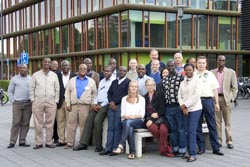During the 3rd week of August, N2Africa project leadership team, core country coordinators and selected partners gathered for Monitoring and Evaluation (M&E) workshop and finalization of other Master Plans of the project.
In order to assess the progress of project implementation and its impacts, a M&E and Data management master plan has been designed to support monitoring of all aspects of the project, i.e. providing information on general progress of the project, information for learning purposes, feedback from/to partners and beneficiaries, and also assessing the final impact of the project and the effectiveness of various systems. This will enable management, donors and partners to receive feedback and deduce lessons, determine the direction and magnitude of progress, and make adjustments to interventions for effective translation of project inputs into outcomes.
The objective of the workshop was therefore to refine and finalize the M&E and Data Management plan for N2Africa focusing on the key milestones, results measurements, methods, tools and approaches to capture results and data management system.
 |
During the workshop, a number of outputs were achieved which include the following: Monitoring and evaluation framework was agreed upon, as well as consensus on the key milestones, proposed indicators and reporting frequency reached; clarity on data collection processes, analysis and reporting procedures including responsibilities for monitoring and evaluation (including strategy for coordination at country level). Specific methods, approaches and tools (including ICT) needed to implement the M&E and Data Management system was discussed and need further development. |
Monitoring and evaluation framework was agreed upon, as well as consensus on the key milestones, proposed indicators and reporting frequency reached; clarity on data collection processes, analysis and reporting procedures including responsibilities for monitoring and evaluation (including strategy for coordination at country level).
Specific methods, approaches and tools (including ICT) needed to implement the M&E and Data Management system was discussed and need further development.
N2Africa is one of the Sentinel Grants Projects under the Gates Foundation which can access additional support for M&E. Such support can be through the development and/or implementation of the project’s M&E system and ALINe is the lead organization in providing such support with funding from the Gates Foundation.
The Agricultural Learning and Impacts Network (ALINe) has since 2009 provided technical research, advice, and facilitation services for monitoring, evaluation and learning in the agricultural development sector. In 2014, ALINe through the Gates Foundation began providing technical support to a portfolio of Sentinel grantees with the objective of assessing and improving their measurement and evaluation efforts.
The gathering also took the opportunity to finalize the Master Plans. N2Africa Project has seven master plans, namely, Agronomy; Dissemination; Rhizobiology; M&E and data management; Gender; Platforms; and Communications. The core country coordinators familiarized themselves with the master plans and helped in finalizing them. Country coordinators are responsible in overseeing project activities in their countries. Therefore, it’s important for all players to have an agreed and common understanding of how activities will be implemented on the ground. Though differences might occur during implementation of activities depending on realities and circumstances on the ground, the master plans will play a key role in guiding activities implementation. Further, they will guide in the development of protocols to execute the activities in all countries. These master plans are evolving documents; hence, depending on feedback and experiences on the ground, they will be periodically updated as necessary. Based on these master plans, protocols will be developed which will be reviewed before their implementation. This will be done before planting of every season. During the workshop, the leadership team and core country coordinators had common understanding of the principles of all the master plans; buy-in from country coordinators; clarity on how to use the master plans for development of protocols; and received enough feedback to develop final versions of all the master plans.
Fred Kanampiu
Some other phto’s from this meeting were published on Facebook on 26 August
